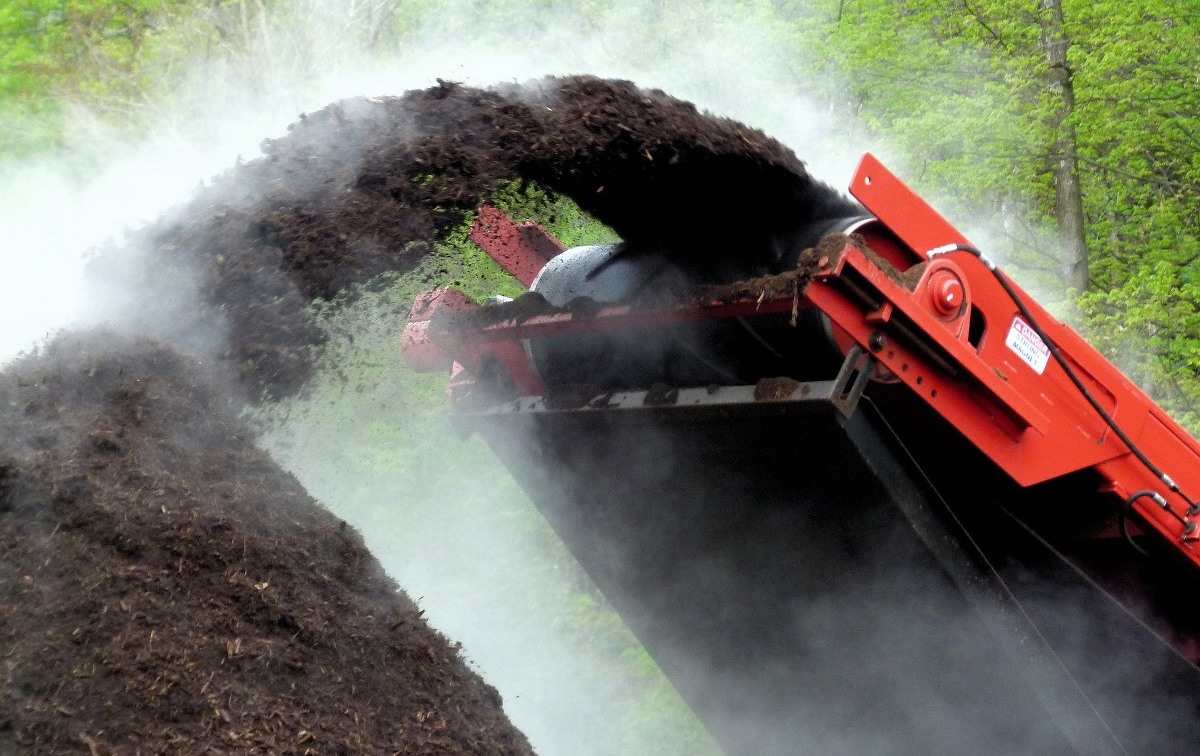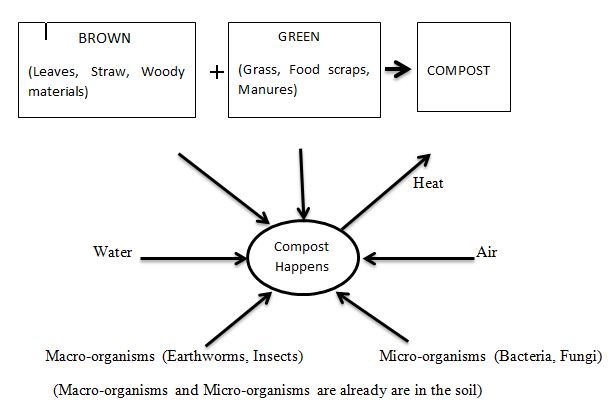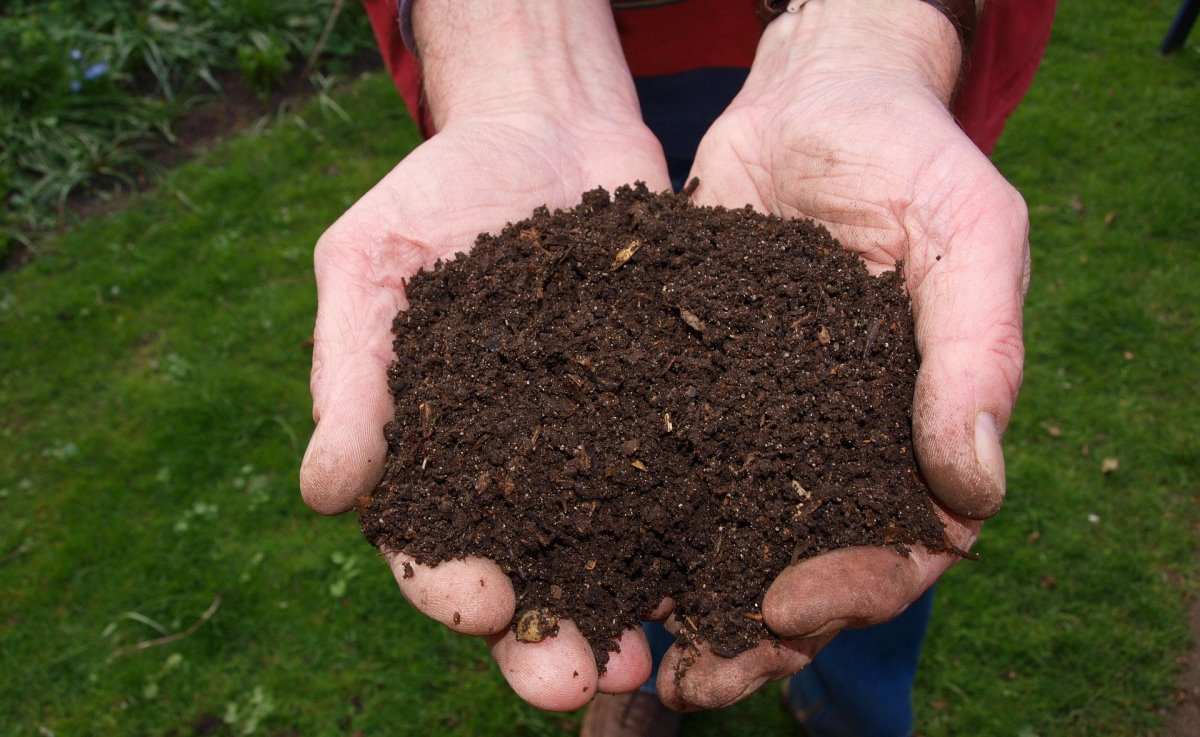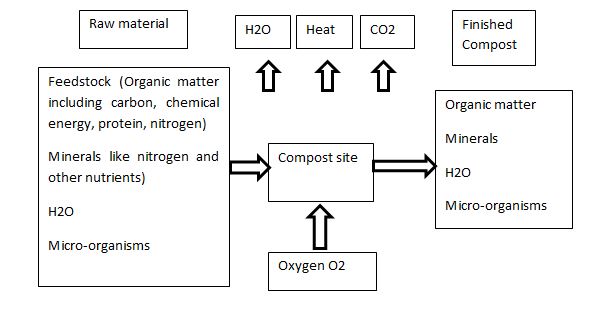Composting Business in India
What is Composting?
Hello friends, today we came up with a new topic called ” How To Start A Composting Business In India For Profit”. Composting method is a natural process that breaks down the organic material into dark rich substance manure which acts as a wonderful conditioner for soil. Also, it is one of the simplest forms of recycling that involves everyday kitchen waste.
Composting defined as a microbiological conversion of organic residues of plant and animal origin to manure rich in humus and nutrients by various micro-organisms like bacteria, fungi, and actinomycetes in the presence of oxygen. During this procedure, it releases by-products such as carbon dioxide, water, and heat. Composting is the method of converting decayed organic material into plant fertilizer.
Compost is the product of controlled aerobic decomposition of organic matter. It is a stable, dark brown, soil-like material. Sometimes the method of making compost may, however, result in smells of rotting waste, although careful management will minimize these. Compost contains important plant nutrients like nitrogen, potassium, and phosphorus, though usually not as much as animal manure or chemical fertilizers. It can contain a range of beneficial minerals and is rich in humus and microorganisms beneficial to plant growth. In this article we also discuss about composting business;
- Is composting a profitable business
- How do I start a composting business
- What is the best composting method
- How to start a compost business in India
- How to sell compost in India
- What are the composting methods
Composting process is a cost-effective process that allows you to earn a profit. Small communities and also villages can be directly involved in creating a business model based on selling compost. Generally, a composting process helps keep the community clean by composting leaves and recyclable organic materials. From this raw material, compost is created that can be sold to consumers or in residential areas. Composting businesses operate out of a large facility where the composting takes place.
A Step-by-Step Guide to How to Start a Composting Business In India for Profit

Benefits of Composting
The Pros of Starting a Composting Business are given below;
In India, composting is an alternative to landfills, for economic and environmental reasons alike. The benefit of starting a composting business is that you’re simultaneously helping the environment. It is all about recycling materials and keeping them out of landfills. It also helps in the soil reconditioning process which is vital for healthier crops and more yields.
Composting also reduces the spread of greenhouse gases by reducing the amount of food waste that ends up in landfills. In the landfills, food material does not decay efficiently and also produces a greenhouse gas called methane. A composting business is relatively easy to establish and the startup costs are minimal.
Composting process adds nutrients to the soil – Compost is nutrient-rich soil. When compost is placed on top of existing soil, it adds nutrients like carbon and nitrogen. Then, these nutrients are used by plants for growth and photosynthesis. Adding compost helps retain water for plant use.
Introduces valuable organisms to the soil – Microorganisms like bacteria, fungi, and protozoa, decompose organic material. The presence of microorganisms is important because they aerate the soil, which speeds up the composting process.
Recycles kitchen and yard waste – Composting keeps as much as 30% of waste from going to the trashcan and this reduces the amount of trash in your home. By diverting some waste, there won’t be required to buy as many trash bags or to take out the trash as often.
Good for the environment – Composting is a lot healthier for the environment. By composting process, you are not relying on factory-made fertilizers and chemicals.
Materials for Starting Composting Business In India
Vegetable waste, cow dung, sawdust, and dry leaves were used for the preparation of different waste mixtures. Vegetable waste can collect from the different hostel. Fresh cow dung was obtained from a nearby village. Sawdust is purchase from a nearby sawmill. Dry leaves are collected from the nearby village. All the materials are mixed in different proportions for making the compost.
All composting requires three basic ingredients;
- Browns – Browns include some materials such as dead leaves, weeds, straw branches, and twigs.
- Greens – Greens includes some materials like grass clippings, tea bags, plant trimming, eggshells, fruit scraps, coffee grounds, and vegetable waste.
- Water – Also, having the right amount of water, greens, and browns is important for compost growth.
Your compost pile must have an equal amount of browns to greens. The brown materials used in the composting process provide carbon for compost, the green materials provide nitrogen, and the water provides moisture to help break down the organic matter. Requirements for Compost Process are Fruits and vegetables, Eggshells, Coffee grounds and filters, Teabags, Nutshells, Shredded newspaper, Cardboard, Paper, Yard trimmings, Grass clippings, Houseplants, Hay and straw, Leaves, Sawdust, Wood chips, Cotton and Wool Rugs, Hair and fur, and Fireplace ashes.
Compost Happens Flow Chart/ Diagaram

What Ingredients Not To Use in Compost Process
Black walnut tree leaves – These are not to use in composting because it releases substances that might be harmful to plants
Coal or charcoal ash – It contains some substances harmful to plants
Some dairy products like butter, milk, and yogurt, and eggs – Creates odor problems and attracts pests
Diseased or insect-ridden plants – Diseases or insects might survive and then transferred back to other plants
Meat or fish bones – It create odor problems and attract pests like rodents and flies
Pet wastes like dog or cat feces, and soiled cat litter – Might contain parasites, bacteria, germs, pathogens, and viruses harmful to humans
Opportunity for Starting a Composting Business in India
Due to the huge production of Municipal Solid Waste (MSW) and improper management practices, the country is facing a lot of environmental effects as well as spending a huge amount of funds on solid waste management. The main problem is the composition of MSW in All over the World and the practices being followed. Since disposal and landfilling is the main practice being followed, it is having a huge impact on the environment by greenhouse gas emission; leachate production, and airborne diseases.
The primary reason is only due to the 40 to 60% composition of organic waste in the Municipal Solid Waste. The best alternative for the issue is the source segregation of wet and dry waste at the generation point and opting suitable treatment method. Some government policies have recommended composting process and vermin-composting for the processing of organic vegetable waste as the sustainable method. Composting of vegetable waste may reduce the environmental impact on climate change by 40 to 70% compared to landfilling and incineration. If you ready for solid waste management and make a composting process, you have a large chance to solve the big problem of the world and also make a health of the entire world and then make a Wealthy company in a few years.
Different Types of Composting Methods in India
Compost turning methods
When it comes to the commercial composting process, you have a few options available. The one you choose will mainly depend upon how you conduct your operation. Below are the main composting and turning methods.
Types of Composting and Understanding the Process
Onsite Composting – Onsite composting requires very little time or equipment. Onsite Composting process is easy and it is an opportunity to use wood waste that keeps the organic material in its original ecological system.
Vermicomposting – The composting process using red wiggler earthworms or red worms is called vermicomposting. The composting procedure remains the same one needs to add the kitchen or vegetable waste in a bin regularly, the earthworms feed on this waste and then transform this waste material into highly fertile manure.
Aerated or Turned Windrow Composting – It is suited for large volumes such as that generated by entire communities. This process is great for small, medium, and large commercial composting operations. Windrows are long piles of compost that can be located indoors or outdoors. Their shape is ideal for making high-quality compost because it can be easily maintained. After that, you can turn the mixture manually or also use a specialized compost turner machine. These come in a different variety of sizes and have varying features to suit the individual needs of your operation.
Aerated Static Pile Composting – Aerated static pile composting produces compost relatively quickly that is within 3 to 6 months. It is works well for larger quantity generators of yard trimmings and also compostable municipal solid waste like food scraps, paper products. This composting process does not work well for composting animal byproducts.
With this process, you will have all of your compost in one large pile. It can be indoors or outdoors, depending on your climate conditions. Turning is done with a compost turner, but you will need to use bulking agents to help aerate the mixture. Operators place the pile over a system of tubing that brings in air from the bottom of the pile. With this process, turning isn’t needed, but more monitoring should be done to ensure proper temperatures are reached.
In-Vessel Composting – This process produces compost in just a few weeks. This process takes a few more weeks or months until it is ready to use because the microbial activity needs to balance and the pile needs to cool.
This type of composting is done inside a regulated vessel such as a drum, trench, or silo. Operators can control the environment for the compost like the temperature, airflow, and moisture content with ease. The vessel itself can turn the mixture that means it is one of the easiest turning methods, or you can turn it manually. This is versatile because it can be done almost anywhere and produces compost from almost any organic material. Though, it is one of the most expensive methods and requires professionals with technical skills to be successful.
You may also like this: How To Grow Beans Hydroponically.
Key Materials to Start Composting Business in India
An essential part of business planning
Any prospective investor (public or private-sector) must consider marketing as part of the feasibility assessment. Market research can help you understand your position in the marketplace, potential customers, and your competitors. A market analysis can reveal that you have a market-ready for your product as it is. It can identify that you need to make changes to your strategy and production to secure a market. Sometimes, it will reveal that there is no market for your product. Knowing this before investing can save you the losses of a failed compost business. Marketing must not be seen as a one-off activity or something just for new businesses. Markets can change over time, and businesses will need to use marketing to keep ahead of changes and ensure you are targeting the right people with the right product and promotion, at the right price.
Key materials for composting process are greens that are nitrogen-rich and browns that are carbon-rich, water, and air. Water allows microbes in compost to grow and help decompose the material. The compost should be moist and air aids in decomposition and controls odors.
Set Up the Compost Farm
Once you know that, you’ll need;
- Either pits or skips to dump the waste in and then let it decompose.
- Tools like shovels, gloves, masks, and bags.
- You need production areas in which you can bag the compost, seal the bags, and label your product. You may select to use an option like fabric buildings as the structure in which compost farm’s operations take place.
- A truck or delivery vehicle. Then, this can be used to pick up the waste at the source, too, to save on costs.
Once you’ve created the organic compost, bagged it, and then labelled it, you’re good to sell it and make a profit.
Here are some ways to use finished compost
- Firstly, mix compost into the soil to improve it.
- Then, spread compost on a lawn to fill in low spots.
- Use mulch for landscaping and gardening.
- Mix compost into potted plants.
Steps to Start Composting Business in India
In case if you miss this: Organic Vegetable Farming In Greenhouse.

The following are some tips to starting your composting business;
Composting Process Flowchart/ Diagaram

1. The basics of your business
One of the first questions you should ask yourself is if the composting process is right for you. It takes work, investment, and knowledge to be successful at making compost. It will be useful to understand the following before going into this business.
- Composting cycles
- Local regulations regarding waste management
- Large-scale composting methods
- The equipment costs, supplies, and other aspects of opening a composting business
- What you can and cannot compost
The science behind composting process, like temperature, moisture levels, microorganisms, and chemical compounds that may affect your product.
2. Where to get waste for your compost
Select places that are looking to give away their organic waste products for free or at a low cost as long as you pick them up.
You should be able to identify your target market, which can include municipalities, farms, and anyone who needs large amounts of compost. By taking care of the entire composting procedure, you will be saving your client’s time and earning large profits.
3. Some equipment and supplies you will need for composting
Once you have some of the above factors sorted out, you can begin thinking about the details of your composting business. This includes your location, costs, and processes. Also, you can start finding your equipment and supplies.
To prepare for buying your tools and supplies for composting business, it is helpful to know the scale of your business and the size of your actual compost site. This is something you could need to know while planning the initial costs for your business as well.
Firstly, know what materials you will be in a composting process, how much waste you will need, and how much compost you want to produce. After that, create a schedule based on the above information. This schedule will keep you on track. Then, you can begin looking at equipment and supplies. If you already have the equipment, you can base windrow sizes on that equipment. If you do not have anything to turn the compost on but know the size of windrows, you can look for machines based on that information. Finally, you can start looking at supplies such as screens, starters, and accelerators.
4. Finding the right compost turner
A large-scale composting business requires heavy-duty equipment that will be long-lasting. These machines will be capable of helping you produce a high-quality product for several years. Compost turners mix air into the windrows to speed up the decomposition procedure. Also, this helps move the right amount of moisture through the pile and regulates the temperature levels. The size of the windrow will help you determine what size turner you need. Then, you can get small, medium, or large self-propelled turners or machines that are pulled by a tractor. If you want a customized compost turner, this is an option as well. And, make sure to speak with a professional to find out which turner is right for you.
Tips to Start a Composting Business in India
Starting a composting business will need you to understand what makes good compost, composting cycles, what to avoid and what to expect during the first few seasons of composting, and the ecological role of composting. Acquiring this knowledge is important if you want to set a successful compost business.
Plan your business
You need to begin your composting business in a place that has access to a large number of organic wastes to be able to sustain the business. This needs a lot of research and you could also take the help of farmers or agriculturalists for the same.
Land
The primary requirement is a piece of land to manufacture your composting. Select the location must be done carefully such that it is traversable to your potential market. Though, it must also not be in the center of a living hub where the smell would cause problems. To begin with, you could rent the land, but make sure to have a flexible arrangement where you can have greater space in the later stages when business would expand. You would require 2 or 3 pits in the land to dump the waste in for it to decompose.
Sources for Organic Waste
The substance you will compost would be biodegradable forms of waste and you would not incur any costs. You can utilize any form of waste in compost depending on the needs of the customer. Then, this waste can be gained from local restaurants, office and housing complexes, schools, and malls- hence, you need to talk to people and create a network.
Tools
You would have to invest in some tools like shovels and rods as well as a vehicle for transportation and bags for packaging as well. Once your business expands, you can purchase a compost turner to enhance your process. However, the startup costs are minimal and you could be eligible for certain tax benefits for your eco-friendly initiatives.
Obtain necessary permits and licenses
State and Local Business Licensing Requirements – Certain state permits and licenses may be required to operate a compost business. Learn more about licensing requirements in your state by visiting SBA’s (Small Business Administration) reference to state licenses and permits.
For information about local licenses and permits;
- Get assistance from one of the local associations listed in the Small Business Associations directory of local business resources.
Certificate of Occupancy
A compost business is run out of a large indoor facility. Businesses operating out of a physical location require a CO means Certificate of Occupancy. It confirms that all building codes, zoning laws, and government regulations have been met.
If you plan to lease a location;
- It is the landlord’s responsibility to obtain a CO.
- After a major renovation, a new CO needs to be issued. If your place of business will be renovated before opening, it is recommended to include language in the lease agreement stating that lease payments will not commence until a valid CO is issued.
If you plan to purchase a location;
- You will be responsible for obtaining a valid Certificate of Occupancy from a local government authority.
- Review all building codes and zoning requirements for business’ locations to ensure your compost business will be in compliance and able to obtain a CO.
Get business insurance
Just as with licenses and permits, composting business needs insurance to operate safely and lawfully. Business Insurance protects a company’s financial wellbeing in the event of a covered loss.
There are many types of insurance policies created for different types of businesses with different risks. If you’re unsure of the types of risks that a business may face, begin with General Liability Insurance. This is the most common coverage that small businesses need, so it’s a great place to start for your composting business.
How to Promote and Market a Compost Business
Promote composting business locally through business cards. Use direct mail advertising to boost sales. Also, go to networking events and talk to local government officials. Talk to local farmers about their soil needs.
Create your business website
While creating a website is an important step, some may fear that it’s out of their reach because they don’t have any website-building experience. Using our website building guides, the process will be simple and shouldn’t take you any longer than 2-3 hours to complete.
Selling Compost for Profit
For selling compost for profit, it is advised to start your business with quality. Though, you do not have to sell it at exorbitantly cheap rates, but rather create quality compost that will speak for its own. You can initially explore bulk sales, even though that brings in smaller turnovers. Once you make a reputation for yourself, you can start selling packaged compost in shops as well as online.
Also, you could directly meet them as well as set up stalls at the farmers’ market. You could harness the power of e-commerce and sell your compost online so that you can create a pan-Indian presence. You could invest in an own website to capture the true essence of composting business.
- How to Make Houseplants Bushy: Effective Tips and Ideas
- Innovative Strategies for Boosting Coconut Pollination and Yield
- Pollination Strategies for Maximum Pumpkin Yield
- The Complete Guide to Chicken Fattening: Strategies for Maximum Growth
- Natural Solutions for Tulip Problems: 100% Effective Remedies for Leaf and Bulb-Related Issues
- Revolutionizing Citrus Preservation: Towards a Healthier, Greener Future
- Natural Solutions for Peony Leaf and Flower Problems: 100% Effective Remedies
- Maximizing Profits with Avocado Contract Farming in India: A Comprehensive Guide
- Natural Solutions for Hydrangea Problems: 100% Effective Remedies for Leaf and Flowers
- The Ultimate Guide to Choosing the Perfect Foliage Friend: Bringing Life Indoors
- From Sunlight to Sustainability: 15 Ways to Use Solar Technology in Agriculture
- The Ultimate Guide to Dong Tao Chicken: Exploring from History to Raising
- The Eco-Friendly Makeover: How to Convert Your Unused Swimming Pool into a Fish Pond
- Mastering the Art of Delaware Chicken Farming: Essentials for Healthy Backyard Flocks
- 20 Best Homemade Fertilizers for Money Plant: DIY Recipes and Application Methods
- How to Craft a Comprehensive Free-Range Chicken Farming Business Plan
- Brighten Your Flock: Raising Easter Egger Chickens for Beauty and Bounty
- How to Optimize Your Poultry Egg Farm Business Plan with These Strategies
Sir I want to know about wormi compost business.
I want to start compost business please help me in that